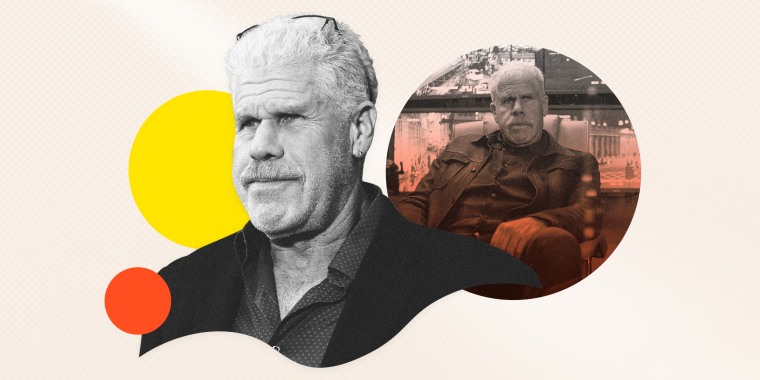Ron Perlman throws himself into the American political fray with profane glee.
The veteran actor — perhaps best known for his roles as a red-hued demon in Guillermo del Toro's "Hellboy" movies and a gruff biker on FX's "Sons of Anarchy" — treats his roughly 1 million Twitter followers to regular bursts of anti-GOP agita, including a recent spat with Republican lawmakers Ted Cruz and Matt Gaetz.
It's not hard to understand why Perlman, 70, would sign on to play a supporting role in "The Capture," a knotty thriller laced with political paranoia and dread. The six-episode series plunges viewers into the murky world of post-9/11 counterterrorism and the modern surveillance state, with a storyline that hinges on doctored digital videos, fake news and suspicion of government.
"The Capture," created by Ben Chanan and featuring Perlman as a mysterious U.S. operative, premiered on BBC One last year, and it makes its U.S. debut July 15 on Peacock. (Peacock is a product of NBCUniversal, the parent company of NBC News.)
In a recent joint Zoom conversation, Perlman and Chanan discussed the origins of "The Capture," while Perlman — never missing a chance to dunk on his Republican nemeses — riffed on his social media hobby.
Here are excerpts from that conversation, edited for length and clarity.
"The Capture" is obviously a work of fiction, but the series is fueled by real-world anxieties about manipulated digital images, such as deepfakes. How did you first get interested in these issues, and when did you realize they would be good subject matter for a series?
CHANAN: It goes back about 10 years, honestly, when I was making a documentary called "The Liquid Bomb Plot." It was about the U.S. and U.K. combined counterterrorism effort and some of the issues with the difference in culture between the two countries, in terms of how they dealt with the legal system. I interviewed people like General Michael Hayden, who was the former head of the CIA, and Michael Chertoff from the Department of Homeland Security [under President George W. Bush].
I got to realize the kind of things that keep them awake at night, you know? What are the next nightmares they need to worry about? What are the ethical dilemmas when they have intelligence that somebody's about to commit an act of terror but they don't necessarily have the admissible evidence in court? But it took me many years to develop that into a story.
Ron, what drew you to this project?
PERLMAN: The fact that they asked went a long way toward me saying yes. [Laughs.] I mean, let's face it: What American kid doesn't dream about being invited by the great BBC to come to London and work on something that has this much import and gravitas? I started reading the material, and I started understanding not only the brilliance of the way Ben has rendered this dilemma, but how incredibly provocative it is for somebody like myself, whose hobby is political junkyism.
You mentioned your "political junkyism," so I have to ask: How are you holding up since your Twitter feud with Ted Cruz and Matt Gaetz?
PERLMAN: I've been doing pushups and situps. I'm ready. [The back and forth between Perlman and the GOP lawmakers climaxed with Cruz's challenging the actor to wrestle Rep. Jim Jordan of Ohio, a former collegiate wrestling coach.] Actually, no, I haven't been doing any of those things. [Laughs.] I've been living in a glow of how easy it was for these guys to stumble into my little trap, which I've been trying to lay for lo these many years. It was delightful to actually get down into the weeds with guys who have absolutely no morality, no core and no ethics whatsoever and tangle with them in front of the eyes of the world. [Laughs.]
The episodes of "The Capture" that I watched reminded me, in part, of paranoid conspiracy thrillers from the 1970s, like "The Parallax View" and Coppola's "The Conversation." Did you have those or any other particular films in mind in terms of stylistic influences?
CHANAN: You've named them, for sure. I was thinking of "The Parallax View" and "Three Days of the Condor." I watched those movies when I was a kid on TV. They dared to be really quite overtly political, while still at the same time having compelling characters. They dared to be bleak and have endings that were challenging and weren't always happy — in fact, very rarely were they happy.
It's no coincidence that those movies were made in the post-Watergate era and that Watergate gave filmmakers and artists a sense of cynicism. I think we're in a similar situation now, where trust in the authorities is probably lower than it's ever been in my lifetime, certainly my adulthood.
PERLMAN: It's the intersection of people who are charged with keeping us safe and then the added factor of whether they have an agenda, and if so, if that agenda is pure or something that serves their own twisted view of what the world needs to look like. That's the dilemma for my character. It's very easy for him to make an argument like "Hey, you're not here to criticize me. You're here to thank me because I'm keeping you safe."
The degree to which this guy is willing to go in the name of that really gets your attention and makes you start to question these people who I should automatically trust — who knows what they're thinking and who knows who they're serving and who knows what ends they are hoping to see come into view? We're seeing that so much as a society in the United States over the last three years.

